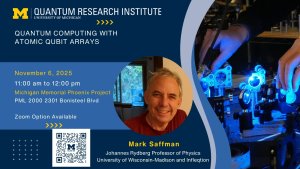Presented By: Quantum Research Institute
Quantum Research Institute | Quantum computing with atomic qubit arrays
Mark Saffman - University of Wisconsin and Infleqtion

In-Person: Michigan Memorial Phoenix Project - PML2000
Zoom: https://umich.zoom.us/j/99333578305?jst=2
Abstract:
Large arrays of neutral atoms are a leading modality in the race towards useful quantum computation. Systems with more than 1000 qubits in 2D arrays and gate fidelities approaching three nines are being developed by many academic and industrial groups. I will present recent progress at University of Wisconsin-Madison and Infleqtion with physical and logical qubit encodings. Interesting challenges remain in scaling the size and performance to the levels needed for quantum utility. Ultimately a modular approach to quantum computation will enable scaling to millions of qubits, with inter-module connections enabled by photonic links. Recent results on entangling atoms with photons for scaling a modular architecture will be presented.
Bio:
Mark Saffman is a physicist working in the areas of atomic physics, quantum and nonlinear optics, and quantum information processing. His research team has been a pioneer in quantum computing with atomic qubits. They were the first to demonstrate a quantum CNOT gate for the deterministic entanglement of a pair of neutral atoms. This was done using interactions between highly excited Rydberg atoms. He is currently developing scalable arrays of neutral atoms for quantum computation, communication, and sensing applications.
He is the Johannes Rydberg Professor of Physics at the University of Wisconsin-Madison and has been recognized with an Alfred P. Sloan fellowship, a Vilas Associate Award, the WARF Innovation Award, and is a fellow of the American Physical Society, and Optica. He has been active in professional service including two decades as an Associate Editor at the Physical Review, and is the director of The Wisconsin Quantum Institute. He also serves as Chief Scientist for Quantum Information at Infleqtion.
Zoom: https://umich.zoom.us/j/99333578305?jst=2
Abstract:
Large arrays of neutral atoms are a leading modality in the race towards useful quantum computation. Systems with more than 1000 qubits in 2D arrays and gate fidelities approaching three nines are being developed by many academic and industrial groups. I will present recent progress at University of Wisconsin-Madison and Infleqtion with physical and logical qubit encodings. Interesting challenges remain in scaling the size and performance to the levels needed for quantum utility. Ultimately a modular approach to quantum computation will enable scaling to millions of qubits, with inter-module connections enabled by photonic links. Recent results on entangling atoms with photons for scaling a modular architecture will be presented.
Bio:
Mark Saffman is a physicist working in the areas of atomic physics, quantum and nonlinear optics, and quantum information processing. His research team has been a pioneer in quantum computing with atomic qubits. They were the first to demonstrate a quantum CNOT gate for the deterministic entanglement of a pair of neutral atoms. This was done using interactions between highly excited Rydberg atoms. He is currently developing scalable arrays of neutral atoms for quantum computation, communication, and sensing applications.
He is the Johannes Rydberg Professor of Physics at the University of Wisconsin-Madison and has been recognized with an Alfred P. Sloan fellowship, a Vilas Associate Award, the WARF Innovation Award, and is a fellow of the American Physical Society, and Optica. He has been active in professional service including two decades as an Associate Editor at the Physical Review, and is the director of The Wisconsin Quantum Institute. He also serves as Chief Scientist for Quantum Information at Infleqtion.